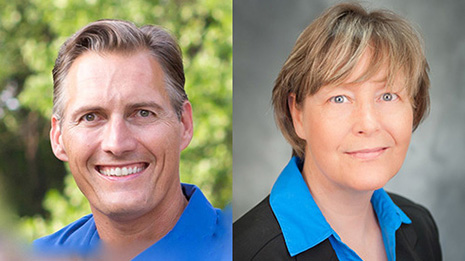FAYETTEVILLE, Ark. – Many times, children with autism spectrum disorders struggle with social and behavioral interaction across settings, including the classroom, home and community. These children desire social relationships but may lack the skills necessary to develop them, said Peggy Schaefer Whitby, University of Arkansas associate professor of special education.
“This may lead to depression and anxiety as they become aware of their differences and have a desire for meaningful, long-term relationships,” Whitby said. “Fortunately, with good intervention social skills can be taught.”
Teaching social skills for this population is critical because the U.S. Centers for Disease Control and Prevention estimates that 1 in 68 children in the United States has an autism spectrum disorder. Autism spectrum disorders are characterized by varying degrees of impairment in communication skills, social interactions, and restricted and repetitive patterns of behavior.
In order to help teachers, families and professionals meet the unique needs of this population, the U of A special education program’s annual ASD Symposium will focus on understanding high-functioning autism and teaching social skills to children with autism spectrum disorders.
The symposium is appropriate for families, early child-care providers, special education teachers, general education teachers, behavior analysts, speech therapists and anyone else interested in teaching children with autism. It takes place from 8:30 a.m. to 3:30 p.m. April 30 and May 1 at the Global Campus on the Fayetteville square. Online registration is open. There is a discounted price for families and students, and professional development credit is available.
Teresa Daly of the University of Central Florida and Scott Bellini of Indiana University, both experts in teaching and supporting people on the autism spectrum, will be this year’s keynote speakers.
Daly is executive director of the University of Central Florida Center for Autism and Related Disabilities. She began her career of more than 25 years serving people with autism spectrum disorders as an assistant in an inclusive preschool program. She was also previously director of training at Emory University Autism Center, where she directed the nationally recognized Walden Toddler Program, an inclusive model demonstration program for the treatment of toddlers with autism.
A board-certified Behavior Analyst, Daly has received multiple grants from agencies that include Autism Speaks, Georgia Childcare Council, the Parker Family Foundation and Department of Education. Her research and training interests include incidental teaching, social interaction and early intervention.
Her presentation, called “Welcome to My Strange Little World,” will target the behavioral and neurological characteristics of students with Asperger’s Syndrome and high-functioning autism and describe organizational, instructional and behavioral strategies for supporting students with this condition in regular education settings.
Bellini directs the Social Skills Research Clinic at Indiana University, Bloomington, a center specializing in developing and empirically examining the outcomes of social skill interventions for youth with ASD. He conducts research on professional development outcomes for educators, anxiety disorders, and social skill interventions, including video modeling for youth with ASD. He has published numerous research manuscripts and has provided consultation and training to families and professionals in more than 35 states on the topic of social skills programming for students with ASD. He is the author of the book, Building Social Relationships, which was named the Literary Work of the Year by the Autism Society of America.
His presentation, titled “Building Social Relationships Through Evidence Based Social Skills Programming for Youth with Autism Spectrum Disorders,” will provide an overview of a social skill instructional model he developed. The workshop integrates research on social-emotional functioning with effective strategies for teaching social skills to children and adolescents with autism spectrum disorders. The five-step model provides a systematic and comprehensive framework to guide parents and practitioners in the development and implementation of social skills programming.
About the University of Arkansas: The University of Arkansas provides an internationally competitive education for undergraduate and graduate students in more than 200 academic programs. The university contributes new knowledge, economic development, basic and applied research, and creative activity while also providing service to academic and professional disciplines. The Carnegie Foundation classifies the University of Arkansas among only 2 percent of universities in America that have the highest level of research activity. U.S. News & World Report ranks the University of Arkansas among its top American public research universities. Founded in 1871, the University of Arkansas comprises 10 colleges and schools and maintains a low student-to-faculty ratio that promotes personal attention and close mentoring.
Topics
Contacts
Peggy Schaefer Whitby, associate professor of special education
College of Education and Health Professions
479-575-3302,
Heidi Wells, director of communications
College of Education and Health Professions
479-575-3138,
